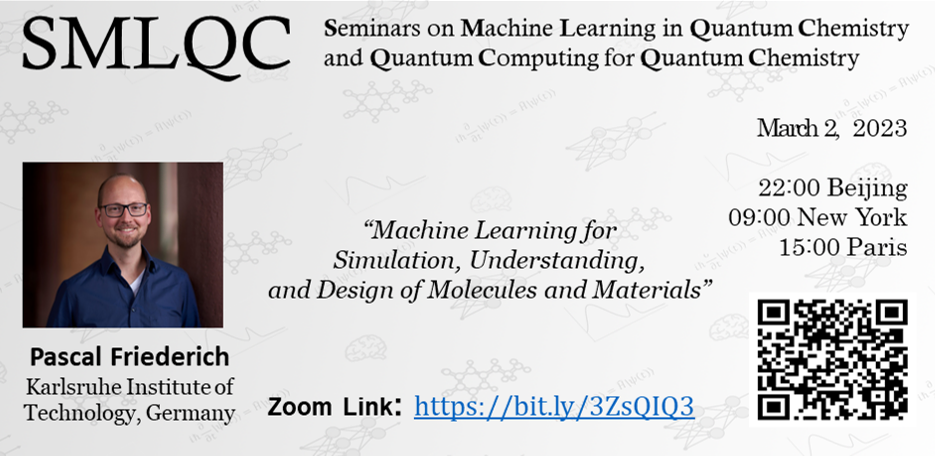The third SMLQC seminar will be given by Pascal Friederich on March 2, 2023 (15:00 Paris | 22:00 Beijing | 09:00 New York).

Title
Machine Learning for Simulation, Understanding, and Design of Molecules and Materials
Abstract
Machine learning can accelerate the design of new molecules and materials in multiple ways, e.g. by learning from large amounts of (simulated or experimental) data to predict molecular or materials properties faster, or by interfacing machine learning algorithms for autonomous decision-making directly with automated high-throughput experiments. In this talk, I focus on our research activities on graph neural networks for materials property prediction [1,2] and understanding of structure property relations [3], as well as on the use of graph neural networks for accelerated atomistic simulations [4,5]. Application areas range from superconductors, metal-organic frameworks and organic semiconductors to photochemical reactions. In the subsequent hands-on tutorial, we will introduce KGCNN, our in-house developed graph neural network library based on Keras/TensorFlow [6].
References
- Reiser et al., Software Impacts 2021, https://www.sciencedirect.com/science/article/pii/S266596382100035X
- Reiser et al., Communications Materials 2022, https://www.nature.com/articles/s43246-022-00315-6
- Teufel et al., NeurIPS Workshop 2022, https://arxiv.org/abs/2211.13236
- Friederich et al., Nature Materials 2021, https://www.nature.com/articles/s41563-020-0777-6
- Li et al., Chemical Science 2021, https://pubs.rsc.org/en/content/articlehtml/2021/sc/d0sc05610c
- https://github.com/aimat-lab/gcnn_keras
Biography
After his B.S. and M.Sc. in physics and a Ph.D. in physics on multiscale modeling of organic semiconductors, Pascal Friederich received a Marie-Sklodowska-Curie Postdoctoral Fellowship at Harvard University and the University of Toronto where he worked on machine learning methods for chemistry. In 2020, Pascal Friederich joined the Informatics Department of the Karlsruhe Institute of Technology as a tenure-track professor, leading the AI for Materials Science (AiMat, https://aimat.science) research group. The AiMat research group focuses on developing and applying machine learning methods for property prediction, simulation, understanding, and design of molecules and materials, as well as on interfacing machine learning methods with automated materials experiments. In 2022, Pascal Friederich received the Heinz-Maier-Leibnitz Prize from the German Research Foundation.